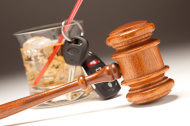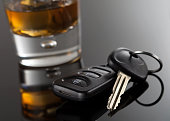 Being pulled over by a police officer is a stressful experience. This is especially true if you know that you have been drinking alcohol. Your mind starts racing and you want to make sure that you don’t give the police officer any reason to suspect that you are under the influence of alcohol. Unfortunately, many motorists don’t really think before they open their mouth. They don’t realize that the police are not there to help them. The police have a job to do and their job begins the moment they notice your vehicle. You need to understand what the police officer is doing and how your conduct and your statements can be used against you in court.
Being pulled over by a police officer is a stressful experience. This is especially true if you know that you have been drinking alcohol. Your mind starts racing and you want to make sure that you don’t give the police officer any reason to suspect that you are under the influence of alcohol. Unfortunately, many motorists don’t really think before they open their mouth. They don’t realize that the police are not there to help them. The police have a job to do and their job begins the moment they notice your vehicle. You need to understand what the police officer is doing and how your conduct and your statements can be used against you in court.
First of all, a police officer cannot pull over your vehicle for no reason. In a typical DUI, a police officer will notice a driver committing a traffic violation. This could be speeding, failure to stop at a red light or a stop sign, or improper lane usage. Once the police officer pulls over your car, the police officer begins making observations that will provide them with the legal justification to pull you out of the car and ask that you submit to a field sobriety test. In order for a police officer to ask that you exit your car to perform a field sobriety test, the police officer must have probable cause to think that you may be under the influence of alcohol. A mere hunch is not enough. The police officer must have specific articulable facts to justify their suspicions.
The police officer will begin making observations as soon as they suspect that alcohol may be involved. If a police officer asks you to exit your vehicle, you should follow the officer’s request. It is not up to you to decide whether the police officer has probable cause to suspect that you may be under the influence of alcohol. The issue of whether the police officer had the legal right to ask that you exit your vehicle is a decision that will be reviewed later on in Court in front of a judge.
 Chicago Criminal Lawyer Blog
Chicago Criminal Lawyer Blog


 Last June, the United States Supreme Court issued a decision in a DUI case that many DUI lawyers had been closely following. The case is actually three separate cases consolidated into one case captioned, Birchfield v. North Dakota. What united all 3 cases was that they all dealt with a North Dakota law which made it an actual crime to refuse to take a breathalyzer test and a blood test when requested to do so by the police. There is no such law in Illinois. A refusal to take a breathalyzer test or blood test can result in the suspension of your driving privileges in Illinois but is not an actual crime in Illinois. However, 13 other states make a refusal to submit to a breathalyzer test or blood test a crime. Both North Dakota and Illinois have “implied consent” laws which means that when you operate a motor vehicle upon the public roads, you consent to submitting to a breathalyzer and a blood test when requested to by the police. Illinois warns you that failure to consent to a breathalyzer test could result in the suspension of your driving privileges while North Dakota warns you that failure to consent to a breathalyzer test could result in criminal prosecution. Refusing to submit to a breathalyzer or a blood test is not a crime in Illinois. The refusal to submit to such testing can only result in the suspension of your license for a period of time, usually one year, if this is your first DUI. Sometimes, refusing to submit to a breathalyzer or blood test could benefit the underlying DUI case making it harder for the state to prove their case with test results, but will not stop the suspension of your driver’s license. Refusing to submit to a breathalyzer test or a blood test is a misdemeanor in North Dakota. By making it a crime to refuse to submit to a breathalyzer or a blood test, a driver would be more likely to consent to such testing, thereby making it easier for the state to prove guilt in an underlying DUI prosecution.
Last June, the United States Supreme Court issued a decision in a DUI case that many DUI lawyers had been closely following. The case is actually three separate cases consolidated into one case captioned, Birchfield v. North Dakota. What united all 3 cases was that they all dealt with a North Dakota law which made it an actual crime to refuse to take a breathalyzer test and a blood test when requested to do so by the police. There is no such law in Illinois. A refusal to take a breathalyzer test or blood test can result in the suspension of your driving privileges in Illinois but is not an actual crime in Illinois. However, 13 other states make a refusal to submit to a breathalyzer test or blood test a crime. Both North Dakota and Illinois have “implied consent” laws which means that when you operate a motor vehicle upon the public roads, you consent to submitting to a breathalyzer and a blood test when requested to by the police. Illinois warns you that failure to consent to a breathalyzer test could result in the suspension of your driving privileges while North Dakota warns you that failure to consent to a breathalyzer test could result in criminal prosecution. Refusing to submit to a breathalyzer or a blood test is not a crime in Illinois. The refusal to submit to such testing can only result in the suspension of your license for a period of time, usually one year, if this is your first DUI. Sometimes, refusing to submit to a breathalyzer or blood test could benefit the underlying DUI case making it harder for the state to prove their case with test results, but will not stop the suspension of your driver’s license. Refusing to submit to a breathalyzer test or a blood test is a misdemeanor in North Dakota. By making it a crime to refuse to submit to a breathalyzer or a blood test, a driver would be more likely to consent to such testing, thereby making it easier for the state to prove guilt in an underlying DUI prosecution. On January 1, 2014, Medical Marijuana became legal in Illinois. The Illinois Medical Marijuana policy is stricter than most other states that have enacted Medical Marijuana. Illinois does not allow Medical Marijuana to be grown at home. The Marijuana must be cultivated at a state-regulated facility that is under strict rules and regulations. To be allowed to use Medical Marijuana, you must apply for permission from the Illinois Department of Health. The application process is strict and it may take several months for you to be approved. If you are approved to use Medical Marijuana, you will be given an identification card. You will only be allowed to purchase 2.5 ounces of medical marijuana every 14 days. The program is tightly restricted and supervised.
On January 1, 2014, Medical Marijuana became legal in Illinois. The Illinois Medical Marijuana policy is stricter than most other states that have enacted Medical Marijuana. Illinois does not allow Medical Marijuana to be grown at home. The Marijuana must be cultivated at a state-regulated facility that is under strict rules and regulations. To be allowed to use Medical Marijuana, you must apply for permission from the Illinois Department of Health. The application process is strict and it may take several months for you to be approved. If you are approved to use Medical Marijuana, you will be given an identification card. You will only be allowed to purchase 2.5 ounces of medical marijuana every 14 days. The program is tightly restricted and supervised. It’s been a tough week. You have been swamped at work and you have been busy at home with activities with the kids. Finally it’s Friday and you made it. Your co-workers invite you to go out for drinks to relax after the end of a long week and you accept. After a couple of hours at a local bar of unwinding with your co-workers and after a few drinks, it’s time to go home. You get in your car and start driving and after a few minutes you realize that you may be in no condition to drive. You don’t know if it’s the alcohol or if you are just tired from your long week, so you decide to pull over and take a nap because you don’t want to take a chance of nodding off while driving and getting into an accident. So you pull over on a side street, park your car, shut off the engine and take a nap. After a few minutes you wake up to the sounds of knocking on your car window. It’s a police officer who is trying to get your attention. You explain to the officer that you are tired so you pulled over to take a nap before heading home. The officer asks you if you have been drinking and you tell him you had a couple of drinks a while ago but had a long week and are just tired. You pull your car keys out of your pocket and the officer asks you to exit your vehicle. The officer asks you to perform certain tests and then informs you that your are under arrest for suspicion of driving under the influence of alcohol. So how can you be charged with a DUI when you were just taking a nap in your car?
It’s been a tough week. You have been swamped at work and you have been busy at home with activities with the kids. Finally it’s Friday and you made it. Your co-workers invite you to go out for drinks to relax after the end of a long week and you accept. After a couple of hours at a local bar of unwinding with your co-workers and after a few drinks, it’s time to go home. You get in your car and start driving and after a few minutes you realize that you may be in no condition to drive. You don’t know if it’s the alcohol or if you are just tired from your long week, so you decide to pull over and take a nap because you don’t want to take a chance of nodding off while driving and getting into an accident. So you pull over on a side street, park your car, shut off the engine and take a nap. After a few minutes you wake up to the sounds of knocking on your car window. It’s a police officer who is trying to get your attention. You explain to the officer that you are tired so you pulled over to take a nap before heading home. The officer asks you if you have been drinking and you tell him you had a couple of drinks a while ago but had a long week and are just tired. You pull your car keys out of your pocket and the officer asks you to exit your vehicle. The officer asks you to perform certain tests and then informs you that your are under arrest for suspicion of driving under the influence of alcohol. So how can you be charged with a DUI when you were just taking a nap in your car?

 This is a very frequent question that I get from people that call me. They want to know how the police can arrest them without any evidence that they did anything wrong. Just because you were arrested by the police and charged with a crime does not mean that you are guilty. An arrest and a criminal charge is just an allegation. The police officer who arrested you, and the prosecutor that charged you with a crime, believe that you did something wrong. Now they must prove you guilty beyond a reasonable doubt in court. There’s several things that you can do to make it more difficult for the police and the prosecutors to prove you guilty in court. Let’s talk about some of the things that you can do to help your case.
This is a very frequent question that I get from people that call me. They want to know how the police can arrest them without any evidence that they did anything wrong. Just because you were arrested by the police and charged with a crime does not mean that you are guilty. An arrest and a criminal charge is just an allegation. The police officer who arrested you, and the prosecutor that charged you with a crime, believe that you did something wrong. Now they must prove you guilty beyond a reasonable doubt in court. There’s several things that you can do to make it more difficult for the police and the prosecutors to prove you guilty in court. Let’s talk about some of the things that you can do to help your case. Every year the Alliance Against Intoxicated Motorists releases it’s annual DUI arrest survey for Illinois DUI arrests. This year’s study has some interesting statistics and numbers that I want to share with my readers. The Alliance Against Intoxicated Motorists sends out surveys to almost 700 police agencies in Illinois. Roughly 81% of the police agencies responded and they release the findings every year.
Every year the Alliance Against Intoxicated Motorists releases it’s annual DUI arrest survey for Illinois DUI arrests. This year’s study has some interesting statistics and numbers that I want to share with my readers. The Alliance Against Intoxicated Motorists sends out surveys to almost 700 police agencies in Illinois. Roughly 81% of the police agencies responded and they release the findings every year. The Arlington Heights Police Department has announced that they will have a Traffic Enforcement Campaign in place from June 26 to July 9, 2017. The Traffic Enforcement Campaign coincides with the upcoming Fourth of July weekend. The Traffic Enforcement Campaign will check motorists and vehicles for seatbelt violations, DUI driving, and a roadside safety checkpoint. The first roadside safety checkpoint will take place on June 28th on Arlington Heights Road just south of Algonquin Road. A roadside safety checkpoint is a way that the police can look inside your vehicle and pull you over to the side if they smell something, or see something inside the car, or suspect that the driver is up to no good. What the Arlington Heights Police are planning on doing this weekend is commonly known as a “Police Roadblock.” The Arlington Heights Police will be looking for people that are not wearing their seat belts and are Driving Under the Influence of Alcohol or Drugs. The enforcement campaign is being paid for with Federal Traffic Safety Funds and administered by the Illinois Department of Transportation.
The Arlington Heights Police Department has announced that they will have a Traffic Enforcement Campaign in place from June 26 to July 9, 2017. The Traffic Enforcement Campaign coincides with the upcoming Fourth of July weekend. The Traffic Enforcement Campaign will check motorists and vehicles for seatbelt violations, DUI driving, and a roadside safety checkpoint. The first roadside safety checkpoint will take place on June 28th on Arlington Heights Road just south of Algonquin Road. A roadside safety checkpoint is a way that the police can look inside your vehicle and pull you over to the side if they smell something, or see something inside the car, or suspect that the driver is up to no good. What the Arlington Heights Police are planning on doing this weekend is commonly known as a “Police Roadblock.” The Arlington Heights Police will be looking for people that are not wearing their seat belts and are Driving Under the Influence of Alcohol or Drugs. The enforcement campaign is being paid for with Federal Traffic Safety Funds and administered by the Illinois Department of Transportation. Illinois has some very strict laws, rules, and regulations involving DUI’s. I frequently get questions from clients asking about whether they should or should not take a breathalyzer when they are requested to by a police officer. There is no simple yes or no answer to that question. Whether someone who has been stopped for a DUI should submit to a breathalyzer test or not is a very complicated question that depends on each case and the specific facts surrounding each case. All I can do is explain what the legal consequences of a refusal to submit to a breathalyzer test would be and what could happen if you take a breathalyzer test and you fail that test.
Illinois has some very strict laws, rules, and regulations involving DUI’s. I frequently get questions from clients asking about whether they should or should not take a breathalyzer when they are requested to by a police officer. There is no simple yes or no answer to that question. Whether someone who has been stopped for a DUI should submit to a breathalyzer test or not is a very complicated question that depends on each case and the specific facts surrounding each case. All I can do is explain what the legal consequences of a refusal to submit to a breathalyzer test would be and what could happen if you take a breathalyzer test and you fail that test.